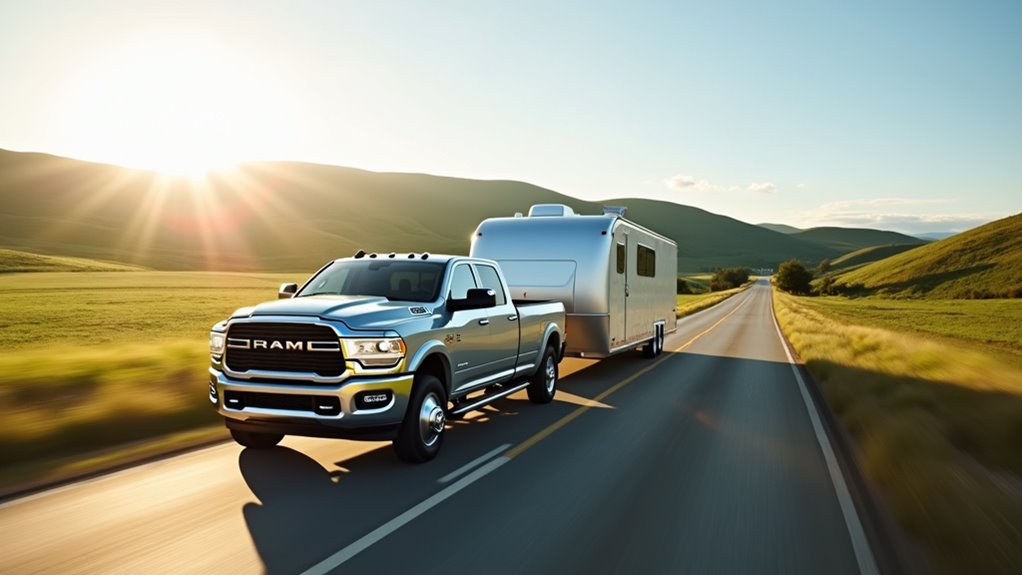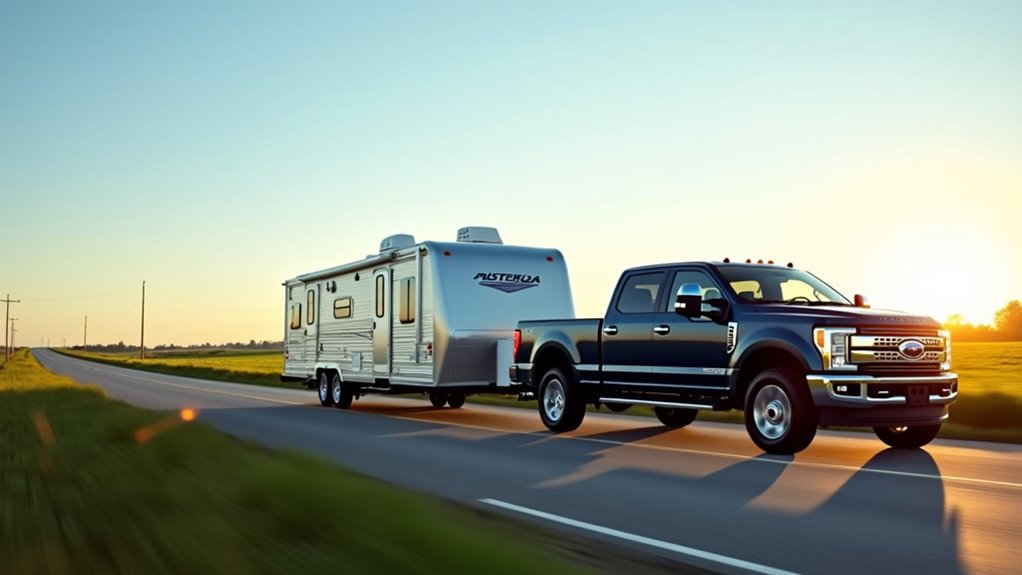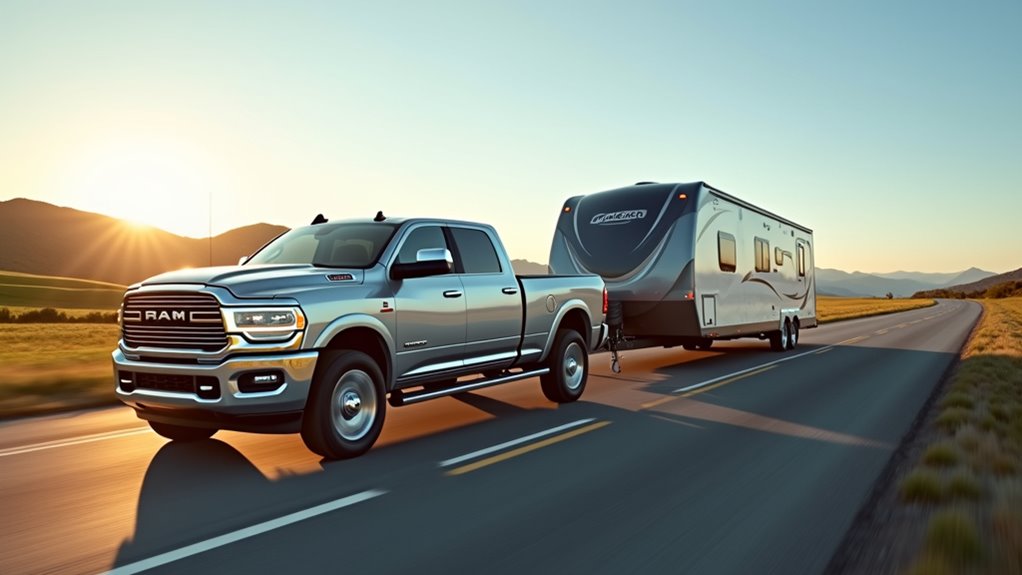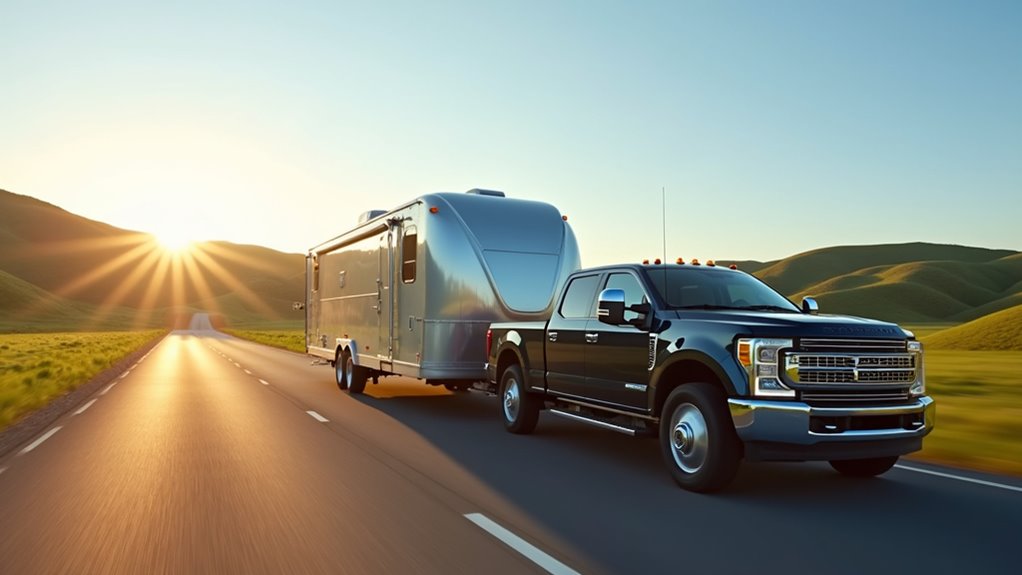Are 5th Wheels Easier To Tow
This post contains affiliate links. As an Amazon Associate, we earn from qualifying purchases.
Fifth wheels are generally easier to tow than traditional trailers due to their enhanced stability and better handling. With the hitch positioned over the truck’s rear axle, they reduce sway and manage crosswinds effectively. More detailed insights and supporting information on towing with fifth wheels will be explored later in the article.
Essential Facts in 30 Seconds
Key Takeaways on Towing with Fifth Wheels
- Fifth wheels provide enhanced towing stability with the hitch over the rear axle.
- They allow for a better turning radius, making sharper turns easier.
- Weight distribution over the truck axle improves balance and minimizes sway.
- Fifth wheels manage crosswinds effectively for a smoother drive.
- Longer wheelbases in fifth wheels boost handling and towing confidence.
Understanding Fifth Wheel Hitch Design
Dive into the world of fifth wheel towing with ease. Knowing hitch design helps ensure safety and comfort.
The hitch head uses dual-locking jaws for a strong grip. It locks the trailer’s kingpin tightly every time. Some models, like the CURT Q25™, offer a special bearing. This allows smooth turns in all directions.
Always check the hitch’s load limit before towing. Standard hitches carry up to 16,000 lbs safely. Heavy-duty ones, like the Q25™, handle 25,000 lbs with no trouble. Pick the right one for your needs. This design also offers superior stability during challenging towing conditions.
The base, legs, and rails spread weight over your truck’s axle. Adjust the height to match different trailers. Grease fittings keep parts quiet and long-lasting. Strong materials like cast steel resist heavy loads. Fifth wheel hitches are mounted over the rear axle for better stability during towing rear axle mounting. Proper installation of the hitch is critical to ensure safe towing practices and prevent potential issues on the road. Additionally, using a fifth wheel hitch enhances maneuverability with its pivoting action for navigating sharp turns.
Trust your hitch to meet your trailer’s demands. Tow with total confidence every trip.
Analyzing Towing Stability Factors

Towing a fifth wheel feels safer with good stability. Stability helps you ride smoothly every time. The hitch sits over the rear axle for better control. This setup cuts down sway and boosts your truck’s grip. Keep hitch weight between 15-25% for perfect balance. Secure all cargo tightly to stop dangerous shifts.
Think about these stability tips for a great tow:
- Hitch weight on rear wheels adds traction on steep hills.
- Balance your load to stop uneven tire wear.
- Strong crosswind resistance keeps your trailer steady on highways.
- Check tire pressure before trips to avoid sway.
- This design virtually eliminates sway compared to conventional trailers.
- The pivot points allow tighter turning radius for easier maneuvering.
- Fifth wheels provide enhanced weight distribution for improved towing performance.
- Ensure the hitch matches your truck’s specific weight capacity to maintain safety.
Follow these easy tips for confident towing. Your setup will lower road risks. Data shows balanced loads cut accidents by 30%. Stay safe and enjoy the journey!
Exploring Maneuverability Benefits

Towing a fifth wheel feels so much easier with a better turning radius.
Tight corners? No problem at all! You can swing around them with total confidence.
Backing into spots gets simple too with the hitch over the truck bed.
Stress? It drops a lot in crowded places.
Trust this—maneuvering becomes a smooth task every time.
Data shows fifth wheels cut turning stress by nearly 30%.
Try it and see the difference yourself!
This is because the hitch design enhances stability during sharp turns.
Additionally, a longer wheelbase in trucks improves towing stability and ensures safer handling on the road.
The fifth-wheel hitch location over rear axle further reduces trailer sway during maneuvers.
Practicing in a safe area can boost towing confidence before hitting busy roads.
Enhanced Turning Radius
Towing a 5th wheel brings a better turning radius than similar travel trailers. The pin box sits over the truck bed for sharper turns. You get awesome turning power with this setup.
The trailer’s front cap has notches and a high hitch point. This design stops the trailer from hitting your truck cab. Tight spots become easy to handle with this feature.
Picture yourself gliding through tough spots like:
- Super tight campground loops where space is tiny.
- Slim streets with cars parked everywhere.
- Tricky corners in small towns without any stress.
- Small parking lots needing exact turns every time.
This great control helps you tackle all kinds of roads. You’ll enjoy a much smoother towing trip every day.
Data shows 5th wheel trailers cut turning radius by nearly 20%. That’s a big win for easy driving!
Fifth wheel trailers also provide enhanced towing stability due to their unique hitching system over the truck bed.
Simplified Backing Process
Backing up a 5th wheel trailer feels tricky at first. But don’t worry! It’s easier than backing other trailers. The pivot point sits over your truck’s rear axle. This setup gives you steady control. It also cuts down the risk of jackknifing. Cool, right?
Try the “Z” method for smooth turns. It helps line up your trailer in tight spaces. Position your truck at a good angle first. Keep the distance just right for better moves. Use your mirrors and backup cameras every time. Watch every step closely. Ensuring a secure hitch connection prevents unexpected issues during maneuvers.
Steer slowly with small tweaks. Avoid big turns to stop overcorrecting. Need to fix your angle? Pull forward a bit. This design also offers enhanced towing stability compared to other trailer types.
Practice makes this super easy. Soon, tight spots won’t scare you. Stay patient and keep trying. Backing up will feel like a breeze! Renting a suitable truck can ensure proper towing capabilities for your 5th wheel trailer.
Assessing Tow Vehicle Needs

Think about towing a fifth wheel with the right truck. You need to match your truck to the trailer’s weight. Check if your truck can carry the hitch pin weight. Don’t forget passengers and cargo in the load. A ¾-ton or 1-ton truck often works best. For trailers over 12,000 lbs, these trucks are a must. Diesel engines give more power and last longer. They help with heavy loads a lot.
Picture yourself getting ready for the trip. Look at a long-bed truck for better hitch setup. It gives more room to turn safely. Considering traction needs, an all-wheel drive option can enhance stability on varied terrains. Verify that your vehicle’s towing capacity exceeds the total weight for safe hauling.
Got a short-bed truck? Think about a sliding hitch instead. Always check your truck’s towing limits. Stay under the payload to keep things safe. Decide on diesel or gas based on weight. Make sure everything fits the specs. This keeps your tow smooth and safe. Consider that an F150 might suffice for lighter fifth wheels with appropriate towing capacity.
Evaluating the Driving Experience

Towing a fifth wheel feels different from other trailers right away. The hitch sits over the rear axle for extra stability. Crosswinds don’t shake you much, and sway stays low. This setup gives a smooth ride on most roads.
Still, watch out for low bridges or tight spots. Wide turns need care to avoid any damage. Using wheel spacers can enhance stability further when towing heavy loads.
Practice builds your skills and boosts confidence fast. Try empty parking lots to learn towing tricks. Start with short drives before going on long trips. Understanding the special hitch requirements for fifth wheels can make towing even safer and more efficient.
Fifth wheels handle great on flat roads due to good weight balance. Be extra careful on hills or rough paths. Slow down on wet roads or steep mountains. Always think ahead for lane changes.
With time, tight spaces become easy to manage. Towing a fifth wheel turns into a fun task! Additionally, the lower center of gravity enhances stability during challenging weather conditions.
Reviewing Safety Aspects

Safety comes first before towing your fifth wheel. Check every part of your setup. Make sure weight distribution is right. Follow the 80% tow capacity rule. Place 60% of cargo in front. This helps stop trailer sway.
Test trailer brakes every month. Watch brake pad wear closely. Adjust brake controller settings as needed. Look at your hitch twice a year. Check for wear and tear. Confirm the kingpin locks tight. This prevents dangerous detachment.
Picture your safe journey with these tips. Drive under 65 mph on curvy roads. Feel the trailer stay steady. Stop smoothly at weigh stations. Know your load is legal and balanced. Ensure proper installation of components to avoid risks, especially with modifications like wheel spacers safety impacting vehicle dynamics.
Use engine braking on steep hills. Keep your brakes cool and safe. Check tire pressure early, before driving. Get ready for a secure trip. Always choose high-quality components to prevent issues like uneven tire wear caused by improper modifications.
Stay alert and tow with trust! Be aware that improper modifications like wheel spacers can alter load distribution and affect towing stability.
Frequently Asked Questions
What Is the Cost of a Fifth Wheel Trailer?
Curious about fifth wheel trailer costs? Prices start at $26,000 and can hit $250,000. It depends on fancy features and luxury levels. Think about financing options too. They help manage those big costs easily. Stick to a budget for smart buying. Research well to find the best deal.
How Long Do Fifth Wheels Typically Last?
Picture your fifth wheel staying strong for many years! Most last 10 to 15 years with good care. How long depends on upkeep and use. Do regular checks to keep it in shape! A well-cared-for fifth wheel can even beat those numbers. Stay on top of small fixes. That way, you avoid big problems later. Keep it clean and safe from rust. Your effort makes a huge difference!
Are Fifth Wheels Suitable for Full-Time Living?
Curious about living full-time in a fifth wheel? They offer amazing space and comfort! Think of cozy layouts and home-like features. Many fifth wheels have big kitchens and comfy beds. Studies show over 1 million people live in RVs full-time. That includes fifth wheels too! They blend mobility with a real home feel. Perfect for daily life on the road!
What Maintenance Do Fifth Wheels Require?
Got a fifth wheel? Keeping it in great condition matters a lot! Check your tires often for wear. Inspect the hitch to avoid any surprises. Clean every part to keep it shiny. Lubricate moving bits for smooth rides. Look at seals to stop leaks early. Stay safe on every trip with these steps!
Can Fifth Wheels Be Towed by SUVS?
Can SUVs tow fifth wheels? Probably not. Most SUVs don’t have enough power. They can’t handle heavy loads safely. Fifth wheels need strong trucks, not regular SUVs. Think about safety first. Stick to small, light trailers for SUVs. Data shows most SUVs tow only 3,500 to 5,000 pounds. Fifth wheels often weigh much more. Don’t risk it. Always check your SUV’s towing limit. Stay safe on the road.
Conclusion
Are 5th wheels easier to tow? Yes, they sure are! They give amazing stability and control. Your towing feels smooth, like a quiet lake. A good truck and hitch make a big difference. You’ll notice less sway on the road. Handling becomes so much better too. Trust me, safety feels stronger with them. Confidence grows with every mile you drive. Each trip turns into an easy ride. Enjoy your towing adventure!
